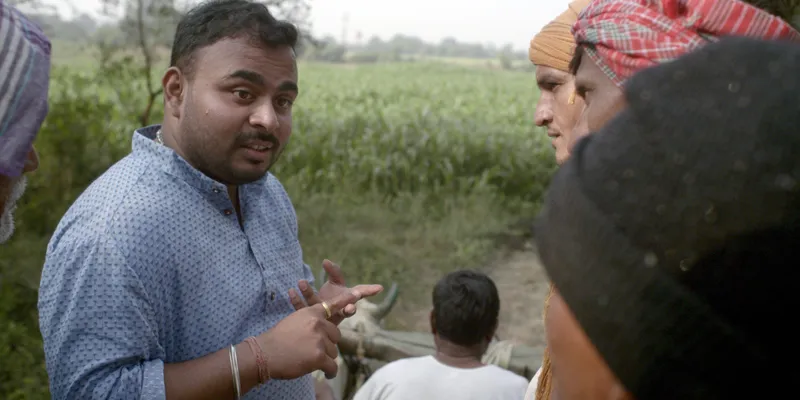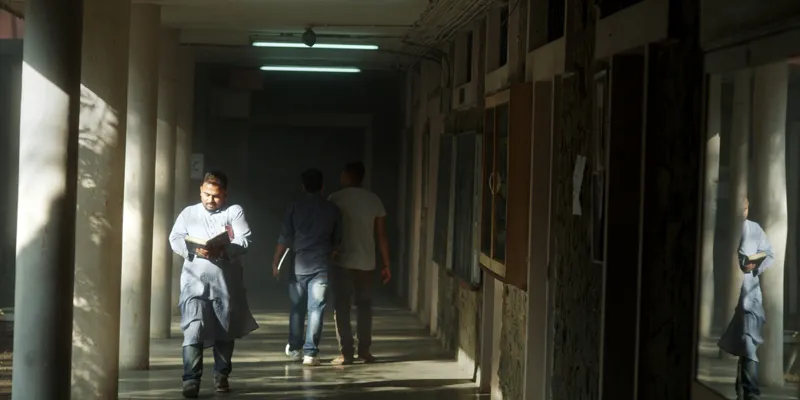How an engineer’s one-cow revolution is transforming Indian agriculture
This article is sponsored by DBS Bank
“Invariably, the solutions to our problems lie right under our noses, yet we scramble to find them elsewhere,” says Chetan Raut, Founder of Cowism. The intriguingly named startup is less than two years old and aims to empower farmers to become self-reliant and financially independent by using traditional, farm-based agricultural solutions. It focuses on integrating commercially useful assets like native cattle into farming practices to improve soil fertility, lower input costs, and raise farmers’ profits.

An engineer by training, Raut hails from an agricultural family in Maharashtra’s Yavatmal district, and is well acquainted with the agrarian crisis sweeping through the region. He remembers feeling a gnawing urge to do something practical and impactful to improve the lot of farmers. Following his heart, Raut, then 23, began a year-long exploration of the agricultural belt of Maharashtra, from the disconsolate cotton growers of Vidarbha to their more prolific cousins in the Konkan.

“Agriculture is flourishing in western Maharashtra because integrated farming is practised there,” says Raut. Farmers dedicate small plots to food and fodder crops, which gives them alternate sources of nutrition and income. In Vidarbha, however, they had switched en masse to mono-cropping with cotton, a lucrative, quick-yielding cash crop. Mono-cropping reduces crop diversity, threatens farmers’ own food security, and leaves them financially vulnerable, at the mercy of the market. Crop failure or pest attacks can drive them to penury and starvation,” Raut points out.
He found that farmers rearing cattle saved substantially on input costs (chemical pesticides and fertilisers often make up as much as 60 percent of the total input cost) by using cow dung and urine to increase land fertility. Cows, besides providing nutrient-rich manure, also yielded a host of high-protein milk products to augment the nutrition of farming families. Most importantly, milch cattle offered a reliable, year-round source of income.
His experiences also left Raut convinced about the merits of indigenous cattle. “Hybrid cows don’t fare well in Vidarbha’s harsh climate, its lack of pastures, and crops that leave behind nothing as cattle feed,” he explains. Indigenous cows are not only hardier and better suited to the region, but are less expensive to feed and maintain. Milk from native cows, also known as A2 Beta Casein milk, is more nutritious, easier to digest, and better for immunity building as compared to more commonly available A1 milk.
Armed with such insights from the field, Raut enrolled in the Master’s programme in Social Entrepreneurship at the Tata Institute of Social Sciences (TISS) in Mumbai to give shape to his ideas of change.
Grassroots solutions to raise agricultural incomes
At TISS, Raut developed the idea of Cowism to raise agricultural income and improve farmer security. Cowism, which started under the aegis of the Arunokalp Social Organisation for Rural Development (ASORD) in Chandrapur, Maharashtra, educates local farmers on the benefits of farming along with related activities like rearing indigenous cows. It advocates the application of natural pesticides and fertilisers like Jeevamrutha, which can be prepared on the farm using cow dung and urine, thus lowering input costs.

ASORD’s core activities include awareness-generation campaigns and free training programmes on sustainable agriculture for farmers, and operating an agricultural input and cow resource centre. On its own farm, the team prepares fertilisers and pesticides from the dung and urine of its own cattle, which is then distributed free of cost among farmers. “The idea is that once farmers see the value of using these organic inputs, they will begin to procure their own native cows and make these inputs independently.”
The third major emphasis of ASORD is the production and sale, at premium rates, of A2 milk in urban markets, the revenue from which funds its non-profit activities. At its milk collection centre, ASORD sells milk produced at its farm. It also supports farmers rearing native cows by procuring milk from them and marketing it through its supply chain. “This helps improve milk quality and fetches farmers better prices than if they were to sell it independently,” says Raut. The centre also freely distributes 10–20 litres of buttermilk a day to villages in the vicinity.
In late 2015, ASORD began developing model farms where it demonstrated to other farmers the feasibility of rearing native cows, multi-cropping, and organic farming with cow-based inputs. In the process, it is building farmers’ confidence and changing their attitudes to chemical-based agriculture.
Changing an age-old mentality is hard work
For all its transformative potential, Cowism does call for a major shift in farming behavior, thus witnessing rather sluggish results. “Farmers, with their countless hardships, are rightly cynical and apprehensive about any counsel, especially from an educated, urban-dwelling, non-farmer like myself,” Raut discloses. Those he approached in the early days of his Cowism, admitted they felt alone and abandoned in their struggle with the land once research and advisory teams dispensed advice and left.
It was then, to be a true ally of the farmer that Raut bid adieu to his big city life and returned to the village to be amidst the community he sought to empower. At a time when agriculture is witnessing an exodus to the cities, Raut’s education guided him back to his roots. “My education made me a better farmer,” he laughs. Currently, more than 100 farmers receive awareness-generation, training, and resource support from ASORD. About 150 families are customers of its A2 milk and more than 500 consumers have been educated about its benefits. In the coming year, the organisation plans to attain profitability and run operations on its own revenue. It aims to scale its reach to surrounding villages, add up to 300 farmers and 500 customers to its network, and up its milk production and procurement.
The crucial value of timely support
“Changing farmers’ mindsets is the slowest and most challenging part of our endeavour and DBS’ trust and early support was invaluable. More so it came at a time when the belief in our model was near zero everywhere,” recalls Raut, acknowledging the financial help the team received. Beginning in its pilot phase, through the social entrepreneurship incubation cell at TISS, the Cowism team received guidance from DBS on formulating its business plan and marketing. With DBS’ initial investment, the team was able to meet the cost of procuring and maintaining assets like cows and build the infrastructure necessary for operating its training and resource centres and experimentation facilities on its farm.
Raut’s is not a novel, technological solution. At its core, Cowism is about empowering farmers to become self-sufficient and financially independent by using traditional, locally available agricultural solutions. It is about recognising the reliable, commercial value of assets like cattle in improving soil fertility, lowering input costs, raising farm incomes, and enhancing the health of farming families. It is about changing the way agriculture is practised in India, one farmer at a time.







